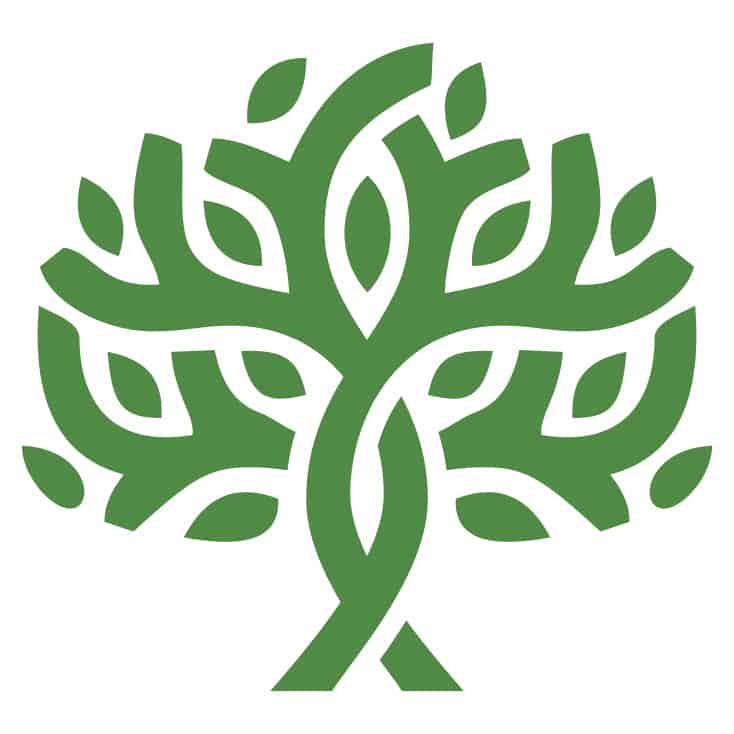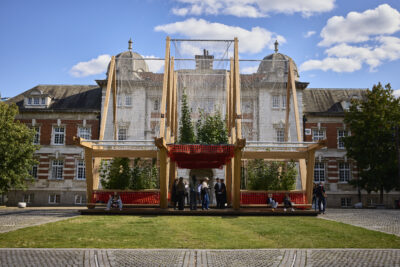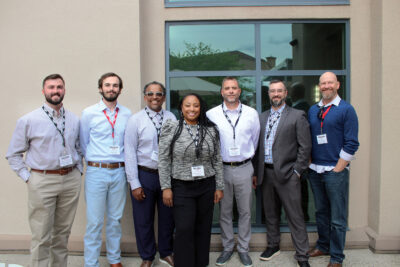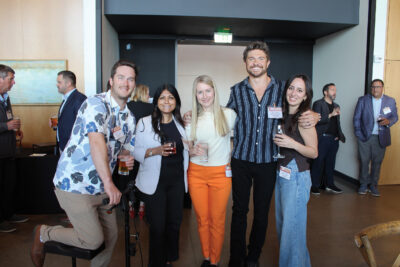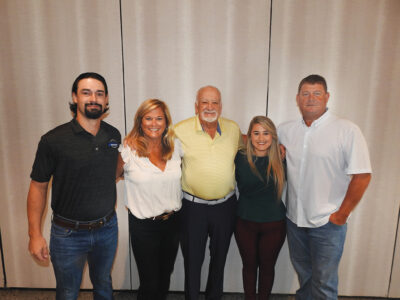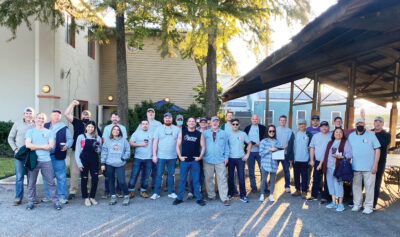(Pictured above, from left): Bonnie Bush, Mindy Markert and Tanya Hauber.
By Sue Putnam
Imagine working daily at a manual edger in a sawmill, physically moving a 16-foot, 22-inch-wide board that weighs 140 pounds through a saw.
Now, imagine you’re a female who stands less than 5-feet 3-inches doing that work.
Bonnie Bush, Tanya Hauber and Melinda (Mindy) Markert will tell you it can be done – they are all 5-3 or shorter – so don’t overlook this gender as a talent pool. Today, all three are head sawyers at Devils Tower Forest Products (DTFP) in Hulett, WY, having risen through the sawmill ranks.
They are also grateful for the essential jobs they hold. “Due to COVID-19, people are understanding these lumber jobs are essential because we contribute to so many products that touch people daily. These are demanding jobs, but rewarding. As a female, though, there are hurdles to overcome. A lot of people don’t have the drive that’s needed to make it in this line of work,” said Bonnie, who, of the three women, has the most accrued time in the sawmill at 26 years. What helped the company was that she held a grading certificate that assisted her in moving into a relief head sawyer spot.
Thus, these women confess they have “thick skin,” which, according to them, is a job requisite in a predominantly male industry. Yet, from a management standpoint, “We are reliant on them,” explained Plant Manager Joe Ortner. He’s been with DTFP five years and in agri-business management longer. Today, DTFP’s staff is about 50 percent female overall. “What I have always appreciated about women that I’ve managed is that, in general, they tend to have a high degree of attention to the equipment and the processes,” he stated.
At a time when attracting and retaining good talent is problematic across all industries, it can be especially challenging for this one. Training plays a role. “In my early years, I found training in the lumber industry could be a little iffy,” said Tanya, a 13-year sawmill veteran. “I recall some men didn’t think I could do it. But they said I could train on the head saw equipment during my 10-minute breaks. That’s all I got—10 minutes a day. I spent three months in training before I sawed a log because it took me that long to figure out the controls. When I sawed my first log, they asked how I figured it out. I picked up the manual and said: by reading this!
“That convinced them I was serious. In any job, some people can teach and some people can’t teach. When you are learning, you must have thick skin because some men don’t think you can learn this as a female and you must take initiative to figure it out. At first I was intimidated; now, though, when I’m sitting in that head sawyer seat, I cannot believe I’m running this huge piece of equipment. It’s like sitting in a pilot’s console. It’s also like chewing gum and walking fast at the same time. But you get it done.”
Tanya’s training evolved as a sawyer partly because Mindy was on maternity leave. Mindy, by all accounts, has the highest/best numbers as a head sawyer of the three. Tanya aspired to follow that example.
“The key is to be so mentally focused on what you are doing every moment,” Tanya commented. “It’s about mental strength because we all have self-doubts. For example, when my son joined the military, he expressed doubt in his ability. I pointed to the muscles on his arm and I said the drive to do this is not found here! And then I pointed to his head and his heart and said, ‘it’s found here!’ That applies to us women in these jobs. None of us are big in size. But our hearts and our minds compensate for that. You must have gumption.”
Mindy agreed. “Honestly, you either ‘get’ this and understand it or you don’t. Not everyone – male or female – is built for this. As a female in this industry, you cannot be a pushover. You must have a backbone because as much as we love all the guys we work with right now, it hasn’t always been that way. They are tough and it’s a man’s world, so we have to really prove ourselves daily. Not to sound judgmental, but usually you can tell the first day whether someone is going to make it or not. That applies to men as well as women.”
Mindy rose from Head Saw 1 position to Head Saw 3, in large part due to her sheer tenacity, a trait she shares with Bonnie and Tanya. “I wanted to run Head Saw 3 for a long time and there were times, early on, when new people were put there instead of me. But I pushed and was told I didn’t have what it took. But you know what? You don’t tell me I can’t do something. I am going to prove to you that I can. Now I’m the second best one they have,” she explained.
The women sacrificed personal time to train and grow in their positions. They’ve also witnessed situations that may have sent faint-hearted men and women in search of a different line of work. But not these three.
“It can be intimidating to be in the cab running the equipment,” said Mindy. “I had an incident this year. I was running the cab of the main Resaw 2 and its bearing went out. Fifteen feet in front of me it ripped the saw, causing the wheel to come off. Production was down for a half day for repairs. It was a mechanical failure. These are very responsible jobs.”
As young girls, their interests leaned more toward what most people view as stereotypically male-oriented. (Tanya recalled that she got C’s in Home Economics, but excelled in Vo-Ag, acing tests that caused her male counterparts to struggle.) Today, all are moms (Bonnie, three sons; Tanya, two sons, one daughter; Mindy, two sons) and they aspire to teach their children to find their career path and work hard to be better than average. Bonnie and Tanya’s husbands (Wes, a Neiman Enterprises lumber salesman, and Greg, also a head sawyer, respectively) work at the same mill. Mindy, who is a single mom, said it can be hard because while she’s working, she misses some aspects of her children’s youth. However, “my kids see how hard I work and everything we have, I bust my butt for,” Mindy explained. “I have no regrets that this is the job I hold, though. This is going to influence my kids as adults in that someday they can have this conversation with their kids about working hard, like we three are now.
“For now, it’s the greatest reward at the end of the day knowing that I am surrounded by great people, great friends, but also knowing what we provide for everyone else from our hard work.”
In fact, none of the women regrets their non-traditional career choice. Bonnie, who is also an EMT, CPR instructor and paramedic, added, “What’s to regret? It hasn’t always been easy but I have a secure job and have health and dental insurance. I am blessed I have a job where I grew up. I cannot imagine living anywhere else.”
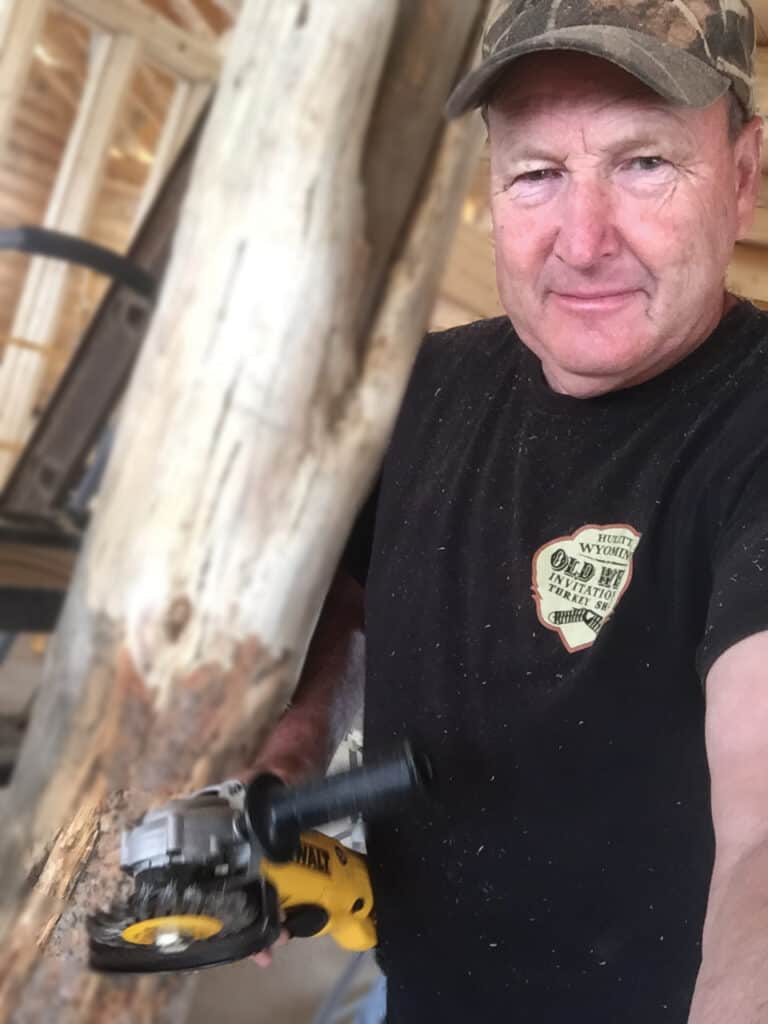
Joe Ortner added, “On a personal note, and to back up those sentiments, I have three daughters. All my girls would fit in this room (with DTFP’s three head sawyers) pretty handily for the same reasons these ladies expressed. They were encouraged as young girls to be competitive, to do their best, not to fight for what they want because they are a girl, but because they want to be the best they can be and an equal and do everything they can to succeed. They simply want to be more than just average. Today, I encourage any woman, as well as any man, to push yourself and see if you can achieve more skills than you ever thought possible.”
Lastly, the group acknowledged gratitude to the ownership of DTFP. Joe summarized: “To have the mix we have here, to encourage women to be part of the organization is a testimony to the ownership of this company. Also, it’s getting better with our efforts here to bring young ladies in as equals and give them the proper training available today, as well as the support needed to be safe in their jobs. Safety is paramount.”
(Editor’s note: DTFP is part of Neiman Enterprises. DTFP produces 45 million board feet of Ponderosa Pine softwood lumber annually. Neiman has two Ponderosa Pine mills in South Dakota. One is Spearfish Forest Products and the other is Rushmore Forest Products. The three mills combined produce approximately 200 million feet of Ponderosa Pine lumber in 4/4, 5/4 and 6/4 thickness. Neiman also operates a stud mill in Montrose, CO that produces about 85 million feet a year and will begin manufacturing Ponderosa Pine this fall in Montrose also.)
